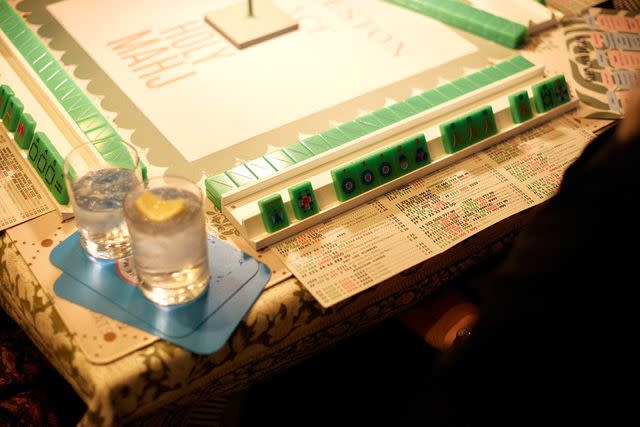How This Classic Game Became the Latest Must-have Hotel Amenity
The classic parlor game is surging in popularity. Could it be the next pickleball?

Courtesy of Ace Hotel New York
The Charleston Place hotel's Palmetto Cafe was packed. It was January 29, but the room was filled with women clad in Lowcountry-casual sundresses, chatting over glasses of prosecco. What held their attention? The captivating sight of tables adorned with vibrant green and pink acrylic tiles. It was the debut of the luxury hotel's Mahjong Night, a burgeoning trend that has resorts across the U.S. adding the 19th-century parlor game to their list of amenities.
Joining Charleston Place in adopting the game is the Ace Hotel New York, in Manhattan, which has hosted seven mahjong evenings since April 2022, in partnership with Asian lifestyle boutique Chop Suey Club. In Fort Worth, Texas, the newly opened Bowie House, Auberge Resort Collection, hosts open play evenings in its Billet Room. At the Thompson Hotel in Dallas, the spring and fall series of Mahjong and Martini Mondays are reservation only — and hosted by Stephanie Brink, otherwise known as The Marvelous Mrs. Mahjong. And in Austin, the adults-only all-inclusive Lake Austin Spa Resort makes a point of teaching guests the basics of the game.

Jonathan Zizzo
“It's beyond popular,” said Cindy Present, director of marketing and wellness at the property. “I had no idea that so many guests would choose mahjong over fitness classes.”
The recent uptick in interest is just the latest for the nearly 200-year-old game, according to Annelise Heinz, a history professor at the University of Oregon and author of “Mahjong: A Chinese Game and the Making of Modern American Culture.”
Since its inception in the mid- to late-1800s in China’s Yangtze River Delta, mahjong has turned into a global phenomenon more than once. Its first leap onto the international stage was in the 1920s, when American consumers were captivated by what those at the time viewed as an exaggeratedly exotic and cosmopolitan pursuit. President Warren G. Harding was one devotee, and Hollywood stars playing the game also bolstered its appeal.

Courtesy of Charleston Place Hotel
In 1937, the National Mah Jongg League, which used an alternative spelling of the game’s name, standardized what is now commonly known as "American Mahjong.” That version, one of around 40 that are popular worldwide, remains to this day the most widely enjoyed form of mahjong in the U.S.
That’s the style of play that you’ll find at hotels across the south, which aim to make mahjong accessible to newcomers. Bowie House, for example, often hosts Kennedy Henderson and Lizzie Gaines, who go by the moniker of the Mahj Girls. At the Charleston Place, instructors Caroline Riley and Anne Ruder take inspiration from the city’s nickname for their own sobriquet: Holy Mahj. Ruder explained that her own interest in the game grew out of its social aspect. “In Charleston, it can seem like all we do is go out to eat — but you can only eat so much,” she shared with T+L. “Mahjong is a fun alternative.”

Courtesy of Ace Hotel New York
For Becky Hubbard, managing director of Charleston Place, hosting players is another way to connect visitors to the city. “Charleston Place is often called Charleston’s living room: it’s an environment where we can give you that positive experience whether you’re a guest or a local,” she said. The added benefit, she continued, is that “mahjong encourages participants to disconnect from technology and engage in meaningful face-to-face interactions.”
That opportunity to connect is one reason that the game has continued to be a touchstone for the AAPI community worldwide. It’s gotten a boost recently from “a pivotal mahjong scene in the blockbuster 2018 film Crazy Rich Asians, [which] highlighted the importance and meaning of the game across the international Chinese diaspora,” as Heinz, the author, detailed in a 2021 story for the Wall Street Journal.
That’s a key element of game nights at the Ace Hotel New York, which often draw hundreds of RSVPs. The idea originated after the hotel’s programming team met with Chop Suey Club founder Ruoyi Jiang in an effort to bring together AAPI creatives, said Jenna Price, a spokesperson for the property. While the traditional Hong Kong style of play is the one favored at the Ace Hotel, Chop Suey Club provides brochures that also mention the many other versions that exist, including American, Japanese, Korean, Taiwanese, Vietnamese, and Wuhanese. Price noted that, with Riang’s help, the evenings provide “a special hub for AAPI New Yorkers to celebrate their heritage through a contemporary lens.”
Jiang echoed that sentiment. “This game has always been about socialization,” she said in an interview. “It’s a way for people to support each other, for people to exchange information. And the ambiance of a hotel can really add to that experience.”
For more Travel & Leisure news, make sure to sign up for our newsletter!
Read the original article on Travel & Leisure.


